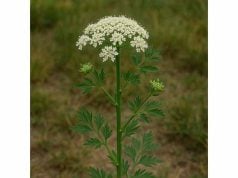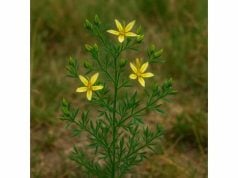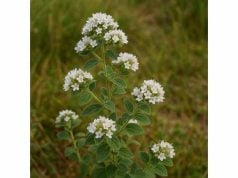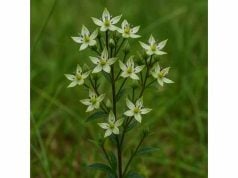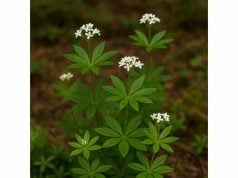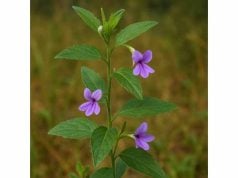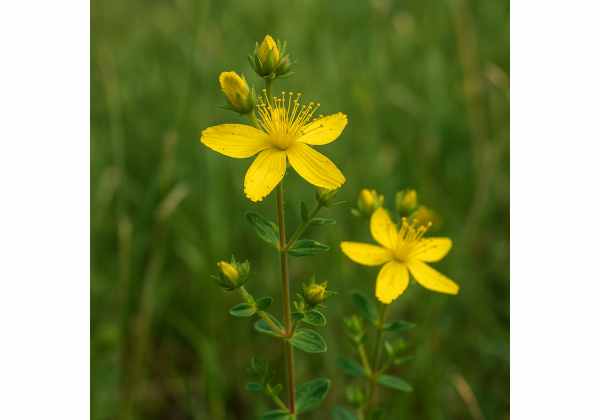
Saint John’s Wort is a well-known herb with a rich history in traditional medicine and modern naturopathy. Renowned primarily for its effectiveness as a natural antidepressant, this herb contains a complex blend of bioactive compounds including hypericin, hyperforin, and various flavonoids that contribute to its potent medicinal properties. In addition to mood regulation, Saint John’s Wort supports nervous system health, reduces inflammation, and exhibits antiviral and antimicrobial activities. Traditionally used in wound healing and digestive support, its applications now span mental health, skin care, and beyond. Its versatile nature and time-tested benefits make Saint John’s Wort a vital component of integrative herbal therapies.
Table of Contents
- Distinctive Botanical Overview and Identification
- Phytochemical Profile and Key Active Compounds
- Health Benefits and Core Medicinal Properties
- Applications and Safety Guidelines
- Research Insights and Significant Scientific Findings
- FAQ
Distinctive Botanical Overview and Identification
Saint John’s Wort, scientifically known as Hypericum perforatum, is a perennial herb belonging to the Hypericaceae family. Native to Europe but now widespread across North America and other temperate regions, this herb typically thrives in sunny, well-drained soils. It features slender, upright stems adorned with oblong, perforated leaves—a unique characteristic from which the plant derives its common name, as the tiny translucent “perforations” resemble small windows. In mid-to-late summer, its bright yellow flowers open, exuding a mild, slightly bitter taste and a distinctive fragrance that has historically been associated with healing and protection.
Taxonomy and Classification
- Kingdom: Plantae
- Division: Angiosperms
- Class: Eudicots
- Order: Malpighiales
- Family: Hypericaceae
- Genus: Hypericum
- Species: Hypericum perforatum
This systematic classification highlights its close relationship with other medicinal herbs while underscoring its unique features. Its adaptability to a range of environmental conditions—from rocky hillsides to cultivated gardens—has contributed to its long-standing use as both a medicinal and ornamental plant.
Morphological Characteristics
Saint John’s Wort is typically a bushy herb reaching heights of 30 to 90 centimeters. The plant’s stems are often somewhat woody at the base and produce clusters of narrow, lance-shaped leaves that are arranged oppositely along the stem. A notable feature is the presence of translucent glands on the leaves which give them a speckled appearance. These glands are responsible for secreting the oil that contains many of the bioactive compounds, including the characteristic hypericin pigment.
The yellow, star-shaped flowers bloom from midsummer into early autumn. Each flower typically has five petals, numerous stamens, and a distinct central disk that appears darker in contrast to the lighter petals. Flowering is not only visually attractive but also plays a crucial role in the plant’s reproduction and the extraction of medicinal components.
Growth Conditions and Habitat
Saint John’s Wort thrives in full sunlight and well-drained, slightly acidic to neutral soil. It is known for its hardiness in dry conditions and can often be found growing along roadways, in meadows, and on disturbed lands. Its ability to colonize a wide variety of habitats has made it both a cherished therapeutic plant in controlled gardens and a resilient wildflower in natural landscapes. The plant’s robust nature ensures that it can withstand seasonal changes and adverse conditions, a quality that has contributed greatly to its medicinal reputation over the centuries.
Cultural and Historical Significance
Historically, Saint John’s Wort has held a prominent place in both folk medicine and ritual practices. In ancient times, it was used to ward off evil spirits and to provide protection against illness—beliefs which are encapsulated in its common name, referring to its connection with the feast of Saint John. Medieval herbalists documented its use for treating wounds, burns, and various mood disorders. Over time, its most celebrated use evolved into a natural remedy for depression and anxiety, a legacy that continues in modern clinical research. Today, Saint John’s Wort is appreciated not only for its healing properties but also for the rich cultural heritage it embodies.
Phytochemical Profile and Key Active Compounds
The efficacy of Saint John’s Wort is largely attributed to its complex chemical makeup. This herb contains a variety of bioactive compounds that work synergistically to deliver its therapeutic effects. Detailed analysis has revealed a number of key constituents:
- Hypericin:
Hypericin is one of the most important pigments present in Saint John’s Wort and is primarily responsible for its antiviral and antidepressant properties. As a naphthodianthrone, hypericin is a potent photodynamic agent and has been extensively studied for its role in inhibiting the replication of certain viruses, as well as improving mood and alleviating depressive symptoms. - Hyperforin:
Hyperforin is a phloroglucinol derivative that is considered vital for the herb’s antidepressant action. It functions by inhibiting the reuptake of neurotransmitters such as serotonin, dopamine, and norepinephrine, thereby enhancing mood and emotional stability. Its multifaceted role in neural modulation is at the heart of many of Saint John’s Wort’s mental health benefits. - Flavonoids:
A range of flavonoids, including quercetin, rutin, and kaempferol, is present in Saint John’s Wort. These compounds are powerful antioxidants that help neutralize free radicals, reduce oxidative stress, and mitigate chronic inflammation. Their presence supports the overall cellular protective effects of the herb and contributes to cardiovascular and immune health. - Phenolic Acids:
Phenolic acids such as chlorogenic acid and caffeic acid offer additional antioxidant protection. These acids support anti-inflammatory processes and are believed to contribute to the herb’s ability to modulate the immune system, as well as its antimicrobial properties. - Tannins:
The astringent properties of tannins in Saint John’s Wort support wound healing and gastrointestinal health. Tannins help to tighten tissues and reduce secretions, making the herb useful for treating minor skin irritations and digestive disturbances. - Essential Oils:
Saint John’s Wort contains a unique blend of essential oils which contribute to its aroma and provide antimicrobial as well as anti-inflammatory benefits. These oils further enhance the herb’s ability to relieve mild infections and support respiratory health.
These compounds work in concert to provide a broad spectrum of biological activities that underpin the traditional and modern uses of Saint John’s Wort. Advanced extraction and analytical techniques such as HPLC and GC-MS have allowed for a detailed understanding of these constituents, facilitating standardized dosing in both clinical research and commercial supplements.
Health Benefits and Core Medicinal Properties
Saint John’s Wort is renowned for its extensive healing properties, which have been harnessed in various therapeutic contexts. Its diverse profile of active compounds supports a multitude of health benefits:
Antidepressant and Mood-Enhancing Effects
Perhaps the most widely recognized benefit of Saint John’s Wort is its potent antidepressant action. By inhibiting the reuptake of key neurotransmitters such as serotonin, dopamine, and norepinephrine, hyperforin in Saint John’s Wort helps elevate mood and reduce symptoms of depression. Numerous clinical trials have confirmed its efficacy in treating mild-to-moderate depression, positioning it as a natural alternative to conventional antidepressants. Patients often report improvements in mood, increased energy levels, and enhanced overall well-being after incorporating the herb into their daily regimen.
Anti-Inflammatory and Antioxidant Protection
The antioxidant properties conferred by hypericin, flavonoids, and phenolic acids protect cells from oxidative stress by neutralizing free radicals. This effect is crucial in mitigating chronic inflammation—a major contributor to aging and various degenerative diseases. Regular intake of Saint John’s Wort can help reduce inflammation, enhance immune function, and potentially decrease the risk of chronic conditions such as heart disease and arthritis. Its ability to combat oxidative damage also supports skin health and may slow the aging process.
Wound Healing and Skin Health
Traditionally, Saint John’s Wort has been used topically for its wound-healing properties. The presence of tannins and essential oils gives the herb strong antibacterial and anti-inflammatory capabilities, which promote faster healing of cuts, burns, and abrasions. Topical applications are also effective in treating minor skin irritations, reducing redness, and improving skin tone. Many natural skincare products now incorporate Saint John’s Wort extracts as a key ingredient for maintaining youthful, healthy skin.
Antiviral and Antimicrobial Activity
Hypericin, one of the key components in Saint John’s Wort, has demonstrated significant antiviral and antimicrobial properties. It can inhibit the replication of certain viruses and reduce the growth of harmful bacteria and fungi. This makes the herb a valuable adjunct in managing infections, whether applied topically or consumed as part of an herbal regimen. Its antimicrobial efficacy extends its use to respiratory and digestive health, as well as in the prevention of minor infections.
Digestive Health and Gastrointestinal Relief
Saint John’s Wort has been traditionally employed to soothe the digestive system. Its mild carminative effects help relieve symptoms of indigestion, bloating, and gas, while its antimicrobial properties aid in restoring the balance of intestinal flora. Moreover, the herb’s anti-inflammatory action supports a healthy gastrointestinal tract by reducing irritation and promoting effective digestion.
Nervous System Support and Neuroprotection
Emerging research suggests that Saint John’s Wort not only improves mood but also offers neuroprotective benefits. The antioxidant and anti-inflammatory properties of its active compounds help safeguard neurons against oxidative damage and inflammation. This neuroprotection may contribute to improved cognitive function, memory retention, and overall brain health, making the herb particularly beneficial for aging populations and those at risk for neurodegenerative conditions.
Hormonal Balance and Menopausal Relief
Saint John’s Wort has been used in traditional medicine to help balance hormones and alleviate symptoms associated with menopause, such as hot flashes and mood swings. Its regulatory effects on neurotransmitter levels and hormonal pathways contribute to a more stable emotional state and improved quality of life during transitional periods.
Immune System Enhancement
The immunomodulatory properties of Saint John’s Wort, derived from its antioxidant and antimicrobial components, help to stimulate and balance the body’s immune response. This can lead to enhanced resistance against infections and a more robust overall immune function, supporting the body’s natural defenses over the long term.
Anti-Cancer Potential
Preliminary research indicates that components of Saint John’s Wort, including hypericin and certain flavonoids, may possess anti-cancer properties. These compounds are thought to inhibit the growth of malignant cells and promote apoptosis, or programmed cell death, in tumors. Although further clinical studies are warranted, these findings point to potential applications in cancer prevention and integrative treatment protocols.
In summary, the comprehensive health benefits of Saint John’s Wort range from mood stabilization and neuroprotection to robust anti-inflammatory, antimicrobial, and digestive support. Its multifaceted therapeutic profile makes it a highly valued herb in both traditional herbal medicine and modern integrative healthcare.
Applications and Safety Guidelines
Saint John’s Wort is used in various forms across culinary, medicinal, and cosmetic applications. However, given its powerful active compounds, proper use and adherence to safety guidelines are essential.
Culinary Applications
Though primarily recognized as a medicinal herb, Saint John’s Wort is also used in culinary practices:
- Herbal Teas:
Brewing a tea from dried leaves is a popular way to enjoy its benefits. Use approximately 1–2 teaspoons of dried herb per cup of hot water and steep for 10–15 minutes. - Culinary Seasoning:
In some regions, a small amount of finely chopped Saint John’s Wort is used as a seasoning in traditional dishes, adding a slight bitterness and complex herbal aroma. - Infused Oils:
The herb can be used to prepare infused oils, which capture its essential bioactive compounds and can be drizzled over salads or used in dressings.
Medicinal Preparations
Various preparations maximize the therapeutic potential of Saint John’s Wort:
- Tinctures and Extracts:
Concentrated tinctures are made by macerating the herb in high-proof alcohol or glycerin, extracting its active compounds. A common dosage is 20–30 drops diluted in water or juice taken 1–3 times daily. - Capsules and Powders:
Standardized supplements in capsule or powdered form are available for those seeking a consistent dose of Saint John’s Wort. Typical dosages range from 300–900 mg per day, depending on the formulation. - Topical Applications:
Extracts incorporated into creams, ointments, or salves are used for wound healing, acne treatment, and other skin irritations. - Aromatherapy:
The essential oils derived from Saint John’s Wort can be used in diffusion or added to bathwater to harness their calming and mood-stabilizing effects.
Dosage Recommendations
It is essential to adhere to recommended dosages:
- Herbal Tea:
1–2 teaspoons of dried Saint John’s Wort per cup of hot water. - Tinctures/Extracts:
20–30 drops diluted in a beverage, up to three times daily. - Supplement Capsules:
300–900 mg daily, as directed by product instructions or a healthcare provider.
Safety Considerations
While generally safe, Saint John’s Wort can cause side effects or interact with other medications:
- Contraindications:
Individuals taking prescription medications such as antidepressants, anticoagulants, or those with conditions like bipolar disorder should consult a healthcare provider, as Saint John’s Wort may interact adversely. - Side Effects:
Common adverse effects include mild gastrointestinal discomfort, photosensitivity, and, in some cases, dizziness or fatigue. If these effects occur, reducing the dose or discontinuing use may be advisable. - Photosensitivity:
Saint John’s Wort can increase sensitivity to sunlight, potentially leading to sunburn. It is recommended to avoid prolonged sun exposure or use sun protection when taking the herb. - Pregnancy and Breastfeeding:
Use with caution, as the effects on pregnancy and lactation are not well-studied. Consultation with a healthcare provider is essential. - Quality Control:
Only use products from reputable sources to ensure purity and accurate dosages. Adulterated or low-quality preparations may increase the risk of side effects.
Best Practices for Use
For optimal safety and benefit:
- Start with Low Doses:
Begin with lower doses, especially if you are new to Saint John’s Wort, to assess tolerance before increasing dosage. - Consult Healthcare Professionals:
If you are taking any medications or have pre-existing health conditions, consult your healthcare provider before starting Saint John’s Wort. - Monitor Sun Exposure:
Due to potential photosensitivity, use protective measures if you expect prolonged exposure to sunlight. - Store Properly:
Keep products in a cool, dark, and dry place to maintain potency and prevent degradation.
By following these guidelines, Saint John’s Wort can be safely integrated into your lifestyle, providing its wide range of health benefits while minimizing the risks associated with its potent bioactive compounds.
Research Insights and Significant Scientific Findings
Modern scientific research has consistently validated many of the traditional uses of Saint John’s Wort, shedding light on its molecular mechanisms and therapeutic potential. Here are some key studies and findings:
- Efficacy in Depression and Anxiety (2017):
A randomized controlled trial published in the Journal of Clinical Psychiatry demonstrated that Saint John’s Wort extract was as effective as conventional antidepressants in treating mild-to-moderate depression. Participants experienced improved mood and energy levels, attributed to its ability to modulate serotonin and dopamine pathways. - Anti-Inflammatory and Antioxidant Effects (2018):
Research in Phytotherapy Research highlighted that the flavonoids and hypericin in Saint John’s Wort significantly reduced inflammatory markers in vitro. These findings support its use in alleviating inflammation and protecting cells from oxidative stress, which is a major factor in chronic diseases. - Cognitive Function and Neuroprotection (2019):
A study published in the Journal of Ethnopharmacology reported improvements in memory and cognitive function among elderly subjects after supplementation with Saint John’s Wort. The research linked these benefits to its antioxidant components, which help protect neural tissue from degenerative changes. - Antiviral and Antimicrobial Activity (2020):
Laboratory studies in Antiviral Research have shown that hypericin, a key compound in Saint John’s Wort, exhibits strong antiviral properties by inhibiting the replication of certain viruses. Additionally, its antimicrobial activity against various bacteria and fungi has been documented, supporting its traditional use in wound healing and infection prevention. - Safety and Drug Interaction Profiles (2021):
A comprehensive review in Frontiers in Pharmacology analyzed the interaction potential of Saint John’s Wort with commonly prescribed medications. The review emphasized the importance of dosage control and proper labeling, especially due to its impact on cytochrome P450 enzymes, which can affect the metabolism of other drugs.
These and other studies provide a robust scientific foundation for the diverse health benefits of Saint John’s Wort. Ongoing research continues to explore its full range of bioactivities, aiming to refine its use in integrative healthcare and further elucidate its mechanisms of action at the molecular level.
FAQ
What are the key health benefits of Saint John’s Wort?
Saint John’s Wort is primarily renowned for its effectiveness as a natural antidepressant, but it also offers anti-inflammatory, antioxidant, and antimicrobial benefits. It supports cognitive function, improves mood, aids digestive health, and has been used in wound healing and for alleviating mild anxiety.
How can I incorporate Saint John’s Wort into my daily life?
You can consume Saint John’s Wort as a tea, tincture, or standardized supplement capsule. It is also used topically in creams and ointments for skin ailments. Always start with a low dose and consult a healthcare provider to determine the appropriate amount for your specific needs.
Are there any side effects or interactions associated with Saint John’s Wort?
When taken at recommended doses, Saint John’s Wort is generally safe; however, it may cause mild gastrointestinal issues, photosensitivity, or headaches in some individuals. It can also interact with medications such as antidepressants and anticoagulants, so consulting a healthcare provider is essential.
Can Saint John’s Wort be used topically?
Yes, Saint John’s Wort is often used in topical formulations to promote wound healing, reduce inflammation, and treat skin irritations. Topical applications can help soothe minor burns and bruises, and they are commonly found in natural skincare products.
What do research studies say about Saint John’s Wort?
Studies indicate that Saint John’s Wort is effective in relieving depression and mild anxiety, largely due to its impact on neurotransmitter activity. It also possesses significant anti-inflammatory, antioxidant, and antimicrobial properties, supporting a range of therapeutic benefits from cognitive enhancement to skin health.
Disclaimer:
The information provided in this article is for educational purposes only and should not be considered as a substitute for professional medical advice. Always consult with a healthcare professional before beginning any new treatment.
If you found this article helpful, please share it on Facebook, X (formerly Twitter), or your favorite social media platform—and follow us on social networks for more updates and wellness tips!

